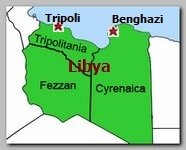– THE LIBYAN TEST CASE
 For more than two decades Islamists won all free elections when and where they took place in the Arab World. So far it is still an unsolved question if Islamic parties in power will conduct with time further free elections and what will be their reaction should they lose them. In other words it is still unclear if democracy, from the point of view of Islamic parties, is a one time opportunity to seize power or an ongoing method to solve political conflicts and differences and a way of genuine political dialog.
For more than two decades Islamists won all free elections when and where they took place in the Arab World. So far it is still an unsolved question if Islamic parties in power will conduct with time further free elections and what will be their reaction should they lose them. In other words it is still unclear if democracy, from the point of view of Islamic parties, is a one time opportunity to seize power or an ongoing method to solve political conflicts and differences and a way of genuine political dialog.
The first free elections in Libya, on 07/07/2012, became a landmark and a test case for the Arab World and the relation between Islam, political Islam and Arab statehood. Libya is still chaotic, large parts, including parts of the capital Tripoli, are controlled by local militias, pro-Gaddafi tribes still hold on in the South, Libyan militants are still hunting alleged “pro-Gaddafi” loyalists who are, actually, just opponents of the militias, and the Eastern province of Cyrenaica has growing sentiment and support for separation or at least large autonomy within the Libyan state (see – Cyrenaica Congress).
In the elections a coalition of about 40 political secular groups,The Liberal National Forces Alliance – NFA, led by the interim prime minister Mahmoud Jibril, has taken the lion’s share of the 80 seats reserved for parties in the 200-seat National Congress, according to early results, and is leading well ahead of the Muslims Brotherhood‘s Justice and Construction Party, led by Mohammed Sawan, in the second place. Libyan Islamists did not expecte defeat amid a trend of Muslim Brotherhood success in neighboring countries swept up in the so called Arab Spring..
The political leanings of the winners of the 120 seats reserved for individual candidates will be unclear for days, if not weeks. All parties packed the individual candidate lists, and the Muslim Brotherhood’s Justice and Construction Party may have been more adept than others. But the signs are that candidates with more local focus than national political affiliations have won the bulk of the seats.
Muslim Brotherhood leader Mohammed Sawan rejected, on Saturday 07/14/2012, any idea of a deal with Jibril. Raising the post-election temperature and offending Jibril’s allies, Sawan has publicly branded Mahmoud Jibril, who served as a planning minister to Muammar Gaddafi but broke immediately with the regime when the LIbyan Civil- War started, of being a former ally of the ousted dictator and the electoral choice of old Gaddafi loyalists (see – LIBYAN DEMOCRACY ).
The new Congress is tasked with overseeing the drafting of a new constitution and picking an interim prime minister and Cabinet. But given its make-up of 120 independent individuals the effectiveness of the congress is in doubt and horse-trading is likely to exasperate the Libyans in the coming months. The uncertainty is an opportunity for Islamists to undermine the shaky Jibril’s block and to. actually, manipulate the congress to their direction.
To sum it up Libya is still facing a long period of uncertainty and anarchy. But it is the first time in the Arab World in free elections that islamists did not sweep the majority easily. It is the first indication that the Green-Curtain over the Arab world is lifted a bit.
- 06/2012 -LIBYAN VETERANS KILLED IN A BORDER ATTACK IN ISREAL
- 05/2012 -MORE LIBYAN WEAPON SEIZED IN EGYPT
- 10/2011 -THE TUNISiAN INDICATION
- 10/2011 -MUAMMAR GADDAFI KILLED IN SIRTE
************************************